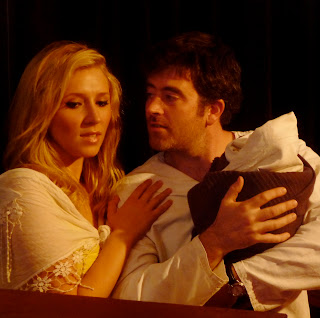The neighbour who encourages the eponymous Pandora’s husband to open the mysterious box remarks, “Without curiosity, where would we be?” As an inquisitive person, a life without curiosity would be unbearable. Taking its cue from the Greek myth, Pandora’s Boxes, which Denise O’Leary originally wrote as a radio play, is given a stylish theatrical transposition by Dimitry Devdariani, offering a quirky and engaging fable exploring what it means to ‘have it all’.
Pandora, her Husband and Baby Son live modestly and contentedly in a rural Eastern European state, uninterested in any kind of change until a “real life box” (a television set) opens up a world of obsessive consumerism. It’s somewhat reminiscent of a comic strip in regard to the broadly drawn characters (only Pandora has a name) and the predictable yet surreal path that they take. O’Leary has an acute ear for the absurd, her gently satirical tone exemplified in the advertisements promoting luxury food, cigarettes and cosmetics that Pandora suddenly can’t live without. Some of the scenes do feel rather choppy, though I wouldn’t want it to be much longer as the 50-minute running time prevents the joke from becoming stale.
The most startling revelation for Pandora (a poignant performance by Margarita Nazarenko) is the idea that a woman can be something other than a housewife and mother. Seduced by the idea of being ‘modern’ like her sister, she sells her long hair in favour of a low-maintenance bob and takes a job selling ‘boxes’ of all different kinds under the guidance of a slippery boss (Richard Holt) who wants something other than hard work in return. The patient Husband (Charles Church) is ultimately more unworldly than chauvinistic, having never had any reason to think outside accepted norms. Victoria Johnston plays the antithetical roles of Pandora’s sister, the perfect model of a ‘modern’ woman whose idea of living life to the full is to make as much money as possible and spend it on designer goods, and a childminder scathing about mothers who don’t bother to look after their own children and treat them as fashion accessories. The cast also deserve credit for Slavic accents that don’t lapse into caricature. The sentimental ending befits a morality tale, but feels simplistic following the questions that precede it.
This would be a good show for a first date – short, light and easy to watch, but also provides plenty to talk about over a delicious home-cooked Rosemary Branch meal afterwards.
Written for A Younger Theatre
10 hours ago


No comments:
Post a Comment